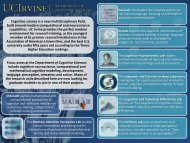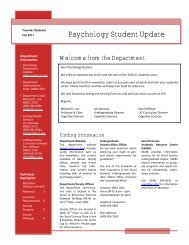Conscious Realism and the Mind-Body Problem - UCI Cognitive ...
Conscious Realism and the Mind-Body Problem - UCI Cognitive ...
Conscious Realism and the Mind-Body Problem - UCI Cognitive ...
You also want an ePaper? Increase the reach of your titles
YUMPU automatically turns print PDFs into web optimized ePapers that Google loves.
<strong>Conscious</strong> <strong>Realism</strong> <strong>and</strong> <strong>the</strong> <strong>Mind</strong>-<strong>Body</strong> <strong>Problem</strong> 113user interface. Efficiency with respect to what if, as MUI <strong>the</strong>ory claims,<strong>the</strong>re is no way to access <strong>the</strong> real world ? The logic here is a little bit likethat of Descartes. Where he suggested that <strong>the</strong> mental world is similar to<strong>the</strong> physical one, MUI <strong>the</strong>ory suggests that <strong>the</strong> mental world is built insuch a way to be a useful schema of <strong>the</strong> physical one. Useful with respectto what ? And why should we need a simplified version ?In answering this objection, we must again be careful how we use ourterms. In particular, as discussed before, <strong>the</strong> phrase real world could mean<strong>the</strong> real worlds of our sensory perceptions, whose existence is observerdependent.Or it could mean a world that is objective, in <strong>the</strong> sense thatit is observer-independent. It is <strong>the</strong> latter interpretation that is probablyintended by <strong>the</strong> objection. If so, <strong>the</strong>n MUI <strong>the</strong>ory does not claim <strong>the</strong>reis no access to <strong>the</strong> real world, but ra<strong>the</strong>r that our access is via sensorysystems that radically simplify, <strong>and</strong> probably in no way resemble, thatreal world. There is access, just no resemblance.Similarly, when this objection speaks of <strong>the</strong> physical world, it presumablyassumes a physicalist ontology, with physical objects <strong>and</strong> propertiesthat are observer-independent. If so, MUI <strong>the</strong>ory <strong>and</strong> conscious realismtoge<strong>the</strong>r do not claim that our sensory worlds are built to be a usefulschema of <strong>the</strong> physical world, for <strong>the</strong>y reject <strong>the</strong> ontology of physicalism.If <strong>the</strong>re is no observer-independent physical world, <strong>the</strong>n <strong>the</strong>re is noreason to build schemas of it. MUI <strong>the</strong>ory asserts, instead, that <strong>the</strong> physicalworld, <strong>the</strong> world of space-time, objects, matter <strong>and</strong> so on, is itself asensory user interface that is observer-dependent. This might be counterintuitiveto a physicalist, but it is not logically self-contradictory. It canbe made ma<strong>the</strong>matically precise, <strong>and</strong> is consistent with quantum <strong>the</strong>ory.With <strong>the</strong>se provisos, we can now address <strong>the</strong> main question of thisobjection, which is why criteria of efficiency <strong>and</strong> usefulness should control<strong>the</strong> user interface. The reason is that, according to conscious realism,<strong>the</strong>re is a reality independent of any particular observer, <strong>and</strong> to interactintelligently or appropriately with that reality one’s sensory perceptionsmust be a useful <strong>and</strong> efficient guide to that reality. <strong>Conscious</strong> realismis not solipsism. There is a reality independent of my perceptions, <strong>and</strong>my perceptions must be a useful guide to that reality. This reality consistsof dynamical systems of conscious agents, not dynamical systems ofunconscious matter. Moreover, this reality is quite complex. So if mysensory systems are to be efficient, <strong>the</strong>y must dramatically simplify thiscomplexity, <strong>and</strong> yet still provide a useful guide.A third objection to MUI <strong>the</strong>ory runs as follows: Inexplicably, <strong>the</strong>table I see is created by my personal user interface, but your table iscreated in a way that is coherent with my own. An ironic reader wouldask whe<strong>the</strong>r <strong>the</strong>y are using <strong>the</strong> same operating system.To answer this, it is important to note that MUI <strong>the</strong>ory does notrequire that your user interface be functionally identical to mine. Evo-







